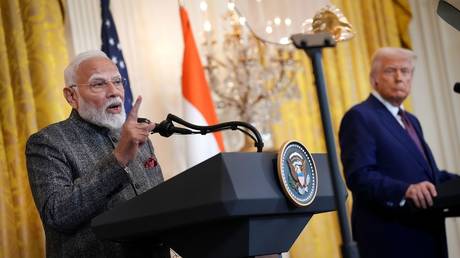India has firmly responded to the recent imposition of a 25% tariff on its goods by the United States, asserting its unwavering commitment to protecting national economic interests while continuing to pursue constructive trade dialogues with Washington.
New Delhi’s Ministry of Commerce emphasized its dedication to securing the welfare of its farmers, entrepreneurs, and small and medium-sized businesses, underscoring that these domestic players remain central to its trade policy objectives amidst global economic pressures.
For several months, India and the US have been engaged in intensive bilateral trade negotiations, aiming to finalize a fair, balanced, and mutually beneficial agreement that addresses concerns from both sides and fosters equitable economic growth.
Drawing parallels to its recently concluded free trade agreement with the United Kingdom, India reiterated its consistent approach to such pacts, affirming that its strategy with other nations, including the United States, will always prioritize the concerns and interests of its diverse economic sectors.
The latest escalation began with former US President Donald Trump’s announcement on his Truth Social account, revealing plans for a 25% tariff and additional penalties on Indian goods, effective August 1. Trump cited India’s “far too high” tariffs and continued trade relationships as primary reasons for these measures.
This recent move follows the US’s earlier imposition of a 26% tariff on Indian goods in March, part of a broader “Liberation Day” tariff initiative against various nations. Although these specific measures were temporarily suspended, the August 1 deadline has brought the issue back to the forefront of US Tariffs discussions.
Indian media reports suggest ongoing negotiations for an interim trade pact, with talks expected to extend beyond the August 1 deadline. Former Indian Foreign Secretary Kanwal Sibal remarked that Donald Trump likely found the proposed interim deal insufficient, advocating for a more significant opening of the Indian market.
Sibal also challenged Trump’s assertion about the limited trade between the US and India, highlighting that Washington is, in fact, New Delhi’s largest trade partner, with bilateral turnover exceeding $132 billion in the last financial year, underscoring the vital economic ties.
As both nations navigate these complex negotiations, the focus remains on finding a resolution that balances national interests with the pursuit of a stable and thriving global economy, ensuring continued engagement despite the current Economic Policy disagreements.






Leave a Reply